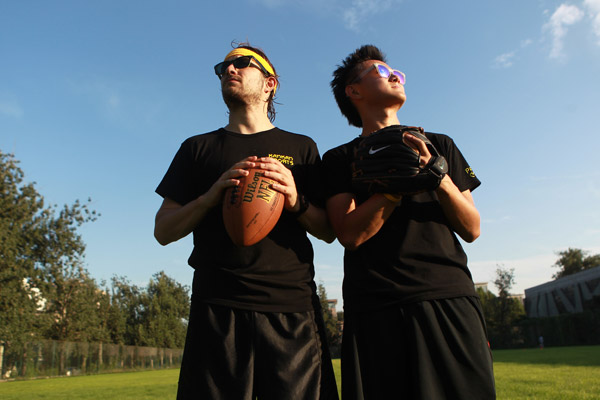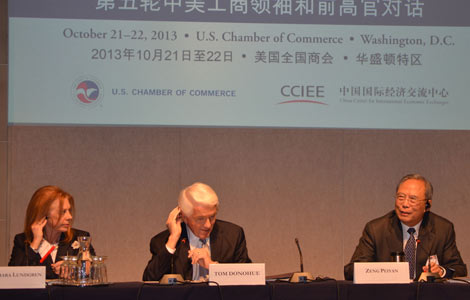Camp gives sporting chance for students headed overseas
Updated: 2013-10-24 00:53
By Sun Xiaochen (China Daily)
|
||||||||
 |
|
Chris Clark (left), a former junior ice hockey coach in the US, is a firm believer in Cong Peien (right), the 18-year-old founder of KanKan Sports, a camp that teaches popular US sports to students set to study abroad. Cui Meng / China Daily |
18-year-old uses athletics to bring cultures together
Initiated by a Beijing teenager, a fledgling sports education program has taken off to bridge the gap between different college cultures in China and the United States.
Academic pace-setters but poor athletes was Cong Peien's opinion of Chinese overseas students when he visited a US university during his summer vocation in 2009.
"They are isolated and struggle to blend in with the mainstream at US colleges as they have little interest in sports," said Cong, a Beijing 101 Middle School graduate, who started his undergraduate program at the University of California, Berkeley in September.
Growing up playing baseball and hockey, the 18-year-old set out to change the stereotype by launching KanKan Sports, a training camp that provides an introduction to US-campus sports in an English-speaking environment to help students set to study abroad make a smooth transition.
"Hopefully, it will help them develop some interest (in the sports we teach) and get them ready for what to expect in the US," Cong said.
The program got off to a flying start in May at its first six-week camp, where 33 high school students practiced English and the fundamentals of baseball, American football and ultimate frisbee with five foreign coaches, whom Cong hired from an expat hockey league in Beijing. They trained for two hours every Sunday on a baseball field at Tsinghua University.
The session started with an instruction on the rules and history of US sports in a group discussion format, followed by warm-ups before exhibition games. An experience-sharing group wrapped up the training day.
At 160 yuan ($26) per week, the first semester ended up with a loss as few students participated in the full six-week sessions due to extra tutorials during summer break.
Cong made up the shortfall on grounds rental and equipment purchases (more than 11,000 yuan), while paying the trainers' salary of 200 yuan per hour with his own savings.
Cong's mother Zhu Dan said: "We didn't, and we won't, provide any help, financially or materially, as he has to learn how to work under pressure.''
Still, the energetic young man is confident he can turn the venture into a profitable business.
"It's a really fun program. Through sports, which are very important in the US, we get to know about sportsmanship and culture-wise, it's a good way to start a conversation and make new friends,'' said Yuan Jiajun, who studied at Kings Christian High School in California after graduating from Beijing No 8 Middle School and has entered the University of California at San Diego this year.
Another camper Wang Yechen, who plans to study abroad next year, said the program not only helped make US sports more popular, but also drew teenagers away from computer games during summer break.
"It feels good to come out and do some outdoor workouts with guys who all intend to study in the US instead of staying at home. Physically and mentally, it's worth the money," Wang said.
Students who have returned from abroad also echoed Cong's belief that sports can bridge cultural gaps.
Zhang Ruoyi, a planning specialist with Huace Media, studied communication management at the University of South California and said sports helped connect students from different countries .
"Sports are the cornerstone of campus culture in the US. Updates about school teams are always hot issues," said Zhang, who developed her interest in American football by following the USC varsity squad.
"Every game day was like a gala carnival and everybody would get involved. If you like sports, it will be much easier to be accepted (by the community) and make new friends."
According to the Chinese Service Center for Scholarly Exchange, 399,600 Chinese students went abroad for study last year making China the biggest student-exporting country in the global education market.
KanKan Sports has already benefited. Its second camp, which opened in June, recruited more students than the first program although Cong raised the weekly fee to 300 yuan to make ends meet.
According to Ivy Labs Education, a US-based education consulting firm that provides college admission counseling to Chinese students, such sports-oriented prep programs are rarely seen in China but the demand is increasing.
"There is a growing need for such a program," said Alice Sun, founder and director of Ivy Labs.
KanKan Sports had to overcome initial skepticism as people doubted Cong's idea would result in a successful business.
However, Chris Clark, a former junior ice hockey coach in the US, who now works with KanKan Sports, is a firm believer in Cong.
"When he told me about how big he wants the camp to grow, I was really excited. It's a big vision for such a young guy," said Clark, who used to play hockey with Cong.
With Cong leaving for the US in September, Clark has prepared to take on more managing roles.
"As young Chinese are really busy, I think the way we grow it into a regular business is to figure out how to make it accessible for the students."
sunxiaochen@chinadaily.com.cn
- Plenary session of World Forum on Sport, Education and Culture
- Students need a sporting chance with physical education
- Foreign students stage Kung fu show for New Year reception
- Official stresses importance of physical education programs
- Foreign students stage Kung fu show for New Year reception
- Government calls for more PE for students
- China to promote students' physical education
- Playing it by the book
- Xiamen University to offer tree-climbing course

 Post-baby Duchess
Post-baby Duchess
 Victoria Beckham S/S 2014 presented during NYFW
Victoria Beckham S/S 2014 presented during NYFW
 'Despicable' minions upset Depp's 'Lone Ranger' at box office
'Despicable' minions upset Depp's 'Lone Ranger' at box office
 'Taken 2' grabs movie box office crown
'Taken 2' grabs movie box office crown
 Rihanna's 'Diamonds' tops UK pop chart
Rihanna's 'Diamonds' tops UK pop chart
 Fans get look at vintage Rolling Stones
Fans get look at vintage Rolling Stones
 Celebrities attend Power of Women event
Celebrities attend Power of Women event
 Ang Lee breaks 'every rule' to make unlikely new Life of Pi film
Ang Lee breaks 'every rule' to make unlikely new Life of Pi film
Most Viewed
Editor's Picks

|

|

|

|

|

|
Today's Top News
HK growing in popularity for foreign companies
Top officials promote new power relations
Iowa, Hebei 'sister' visit wraps up
Yingli uses US sports stars in campaign
NASA: Chinese scientists not banned
China's US Treasury holdings hit six-month low
Graduate looks at kung fu-hip hop connection
Apple unveils new Macs, iPad
US Weekly

|

|







